We're sorry. An error has occurred
Please cancel or retry.
The Politics of Not Speaking

Some error occured while loading the Quick View. Please close the Quick View and try reloading the page.
Couldn't load pickup availability
- Format:
-
02 August 2025

In contrast to the common understanding of politics as a domain of speaking, reveals an alternative tradition where the spoken word fails, collapses, breaks (i.e., a politics of not speaking).
According to a common conception, modern politics is based on speaking, on discussion and rational argumentation-on "logos." In contrast, The Politics of Not Speaking argues that politics is based not on speaking but on the suspension of conversation, on the break of rational discourse, on "logoclasm"-on politics of not speaking. Elad Lapidot presents the notion of politics as logoclasm through readings of five canonic thinkers of the twentieth century: Carl Schmitt, Martin Heidegger, Frantz Fanon, Gayatri Spivak, and Jacques Derrida. Tracing the development of the politics of not speaking from the 1930s to the 1990s, he shows how the notion of logoclasm, the rupture of rational discussion, explains key notions in modern politics, such as sovereignty, law, the state, violence, war, race, colonialism, decolonization, and boycott, and sheds light on current debates concerning the Boycott, Divestment, Sanctions (BDS) movement and the Gaza war.


"There are many books on the decolonial perspective but The Politics of Not Speaking stands out in its innovative approach to decolonialism as the politics of not speaking, based on the deliberative logoclastic crisis. Originating in talks centered around close readings of Schmitt, Heidegger, Fanon, Spivak, and Derrida, the highly accessible style makes this a useful text for undergraduate and graduate courses on decolonialism and political theology, among others." — Agata Bielik-Robson, author of Derrida's Marrano Passover: Exile, Survival, and the Metaphysics of Non-Identity
Acknowledgments
Introduction
1. Politics as Break of Logos: Carl Schmitt
2. Dialogue as Violence: Martin Heidegger
3. Decolonialism as Logoclasm: Frantz Fanon
Corollary I: On BDS: On the Boycott, Divestment, Sanctions (BDS) Movement
4. Can't Speak: Gayatri Chakravorty Spivak
5. No One Language: Jacques Derrida
Corollary II: On Jewish-Christian Dialogue
Not Last Words
Notes
References
Index



